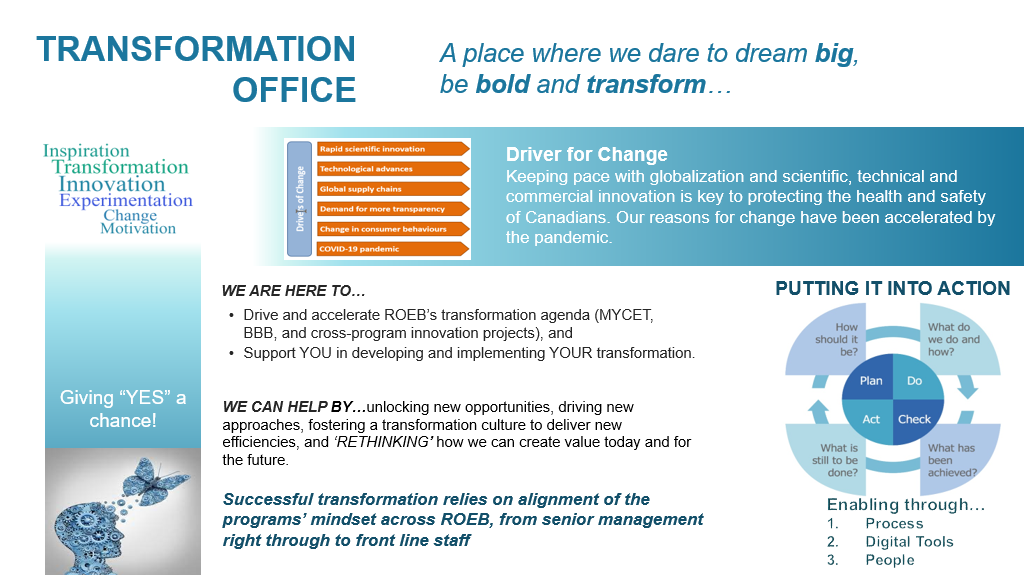Difference between revisions of "ROEB-Digital Transformation"
Peter.yoon (talk | contribs) (return test) |
Peter.yoon (talk | contribs) |
||
| Line 42: | Line 42: | ||
There are many [[wikipedia:Web_scraping|web scraping]] initiatives currently exploring various open or closed source technologies. [[Project Sparrow]] (Waterloo Experience) is an experiment examining the Microsoft 365 / PowerApps platform through a partnership between [https://www.altaml.com/ AltaML], Microsoft, and the University of Waterloo and ROEB (Transformation Office, Medical Devices Compliance) to collect data from Open Web. The goal is to assess feasibility of both publicly available data and Artificial Intelligence technologies to provide insight of risk via medical device products. | There are many [[wikipedia:Web_scraping|web scraping]] initiatives currently exploring various open or closed source technologies. [[Project Sparrow]] (Waterloo Experience) is an experiment examining the Microsoft 365 / PowerApps platform through a partnership between [https://www.altaml.com/ AltaML], Microsoft, and the University of Waterloo and ROEB (Transformation Office, Medical Devices Compliance) to collect data from Open Web. The goal is to assess feasibility of both publicly available data and Artificial Intelligence technologies to provide insight of risk via medical device products. | ||
| − | |||
<br> | <br> | ||
<br> | <br> | ||
Revision as of 10:33, 8 June 2021
ROEB Transformation is a movement to evolve the Regulatory Operations and Enforcement Branch (ROEB) at Health Canada into the digital era, by all employees for all Canadians.
Today’s regulatory landscape is complex and continually evolving, through rapid scientific innovation, technological advances and global supply chains. ROEB is committed to modernizing and transforming its compliance and enforcement approach to become more agile, assertive, consistent, innovative, proactive and risk-based. Digital Transformation is large part of this commitment, supported by the Multi-year C&E Transformation plan, which directs and coordinates transformation efforts across ROEB’s compliance and enforcement programs.
The Transformation Office was established to both support and lead this transformation movement by collaborating with compliance and enforcement programs to curate the mindset critical for change. As part of this movement, the Transformation Office, in collaboration with many divisions and programs within ROEB and beyond, is testing and applying novel technologies to advance compliance and enforcement into the digital era.
Technology Being Tested
Natural Language Processing (Artificial Intelligence):
There are several projects testing Natural Language Processing to support uses cases within ROEB. Project Cipher is a prime example of this technology to support the inspection programs. Project Cipher began as a Solutions Fund project to test the technology applied to inspection observations to create an automated process to assign risk to each observation and other business process requirements critical within many inspection programs (for example: assignment of "Standard Lines").
Robotics & Remote Sensing (Drones and Satellites)
As part of a Solutions Fund project called Hummingbird, ROEB has been testing data collected using drones and satellites to assess value when applied to outdoor cannabis inspections. To find out more, please visit the Hummingbird repo.
Computer Vision (Artificial Intelligence):
Project Cyclops, a ROEB Solutions Fund project, leverages computer vision to detect and interpret text in images via optical character recognition. This technology supports checking instances of non-compliance in natural health project labels examined by inspectors.
Virtual Reality:
There are many plans to leverage Virtual Reality (VR) technology to support both inspection training and outreach / education activities ROEB is responsible for. Preliminary research is being conducted to further examine this technology. An example, Project Apollo created a VR tool to create a learning environment to public consumption.
Augmented Reality (mixed reality):
Augmented Reality is a type of immersive technology that overlays digital information in an analogue environment. Project Cyclops is a project that has plans to leverage this technology to support virtual inspections or tools to automate inspections.
Social Media Monitoring (Artificial Intelligence):
Project Kelpie is exploring Social Media data to directly inform decisions by understanding youth and the vaping market
Data Lakes (Data Sharing):
[Insert Content]
Windows Virtual Desktop Environment:
[Insert Content]
Geographic Information Systems:
There is a growing need to incorporate geospatial information as part of the analyses conducted by many ROEB inspection programs. The Transformation Office is examining GIS technology to support various data augmentation needs. Project Sia is examining GIS platforms to integrate data to inform Compliance & Enforcement decisions using map-based visualization tools. Example technology: ArcGIS StoryMaps
Web Scraping:
There are many web scraping initiatives currently exploring various open or closed source technologies. Project Sparrow (Waterloo Experience) is an experiment examining the Microsoft 365 / PowerApps platform through a partnership between AltaML, Microsoft, and the University of Waterloo and ROEB (Transformation Office, Medical Devices Compliance) to collect data from Open Web. The goal is to assess feasibility of both publicly available data and Artificial Intelligence technologies to provide insight of risk via medical device products.
Technology Being Piloted
Low Code / No Code Automation
Robotic Process Automation
- Pilot with UiPath (Medical Device)
- Pilot with Blueprism (ALR)
- Technology assessment/Options Analysis and procurement
Digital Notebooks
POD-TBI is currently experimenting with “SceneDoc” application, a Digital Notebook solution created and designed with regulatory officers and their needs in mind. This mobile software fills many of the gaps that currently exist for ROEB C&E inspectors in the field, including their ability to effectively and efficiently collect, track, and store information from an inspection using smartphone or tablet. The SceneDoc – Digital Notebook would also provide a solution for extracting digital content, such as pictures, video and other multimedia from smartphones.

